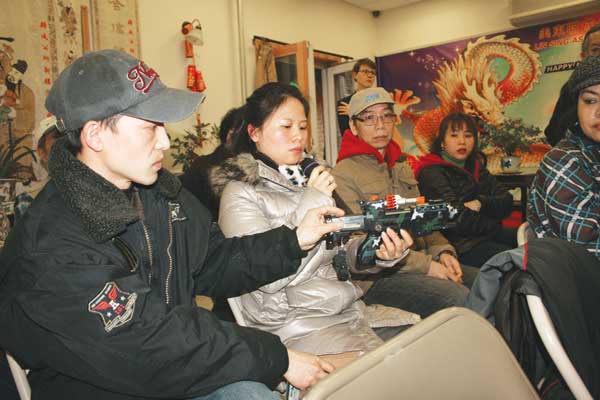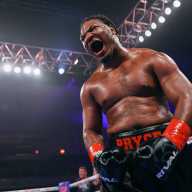 [/media-credit]
[/media-credit]
- Yan Liang, a store owner at 153 Centre St., complained of being fined $900 on two separate occassions for selling a counterfeit toy gun that she thought was authnetic.
BY ALINE REYNOLDS | Unlicensed vendors loitering along Canal Street aren’t the only ones selling counterfeit handbags, toys and other knock-off merchandise to passersby.
Police have recently discovered several local mom-and-pop business owners are also violating the law. But some of these businesses claim they’re being handcuffed and fined without comprehending what they did wrong.
The issue was cause for an information session Manhattan Borough President Scott Stringer convened for neigborhood vendors. The forum was hosted by local elected officials and the New York Police Department’s Manhattan South Peddler Task Force at the Lin Sing Association at 49 Mott St. last Friday, Feb. 24. Specifically, the meeting was organized to address the cops’ November raid of Chinatown stores in search of counterfeit toys and t-shirts carrying the logo of the cell phone action game, “Angry Birds.”
In the days and weeks after the raid, which resulted in close to 50 arrests, several merchants contacted Stringer’s office claiming to be surprised and confused, the Borough President said at the meeting.
“The vendors said they tried to do the right thing and said they didn’t know that the ‘Angry Birds’ merchandise was counterfeit,” said Stringer. “This [meeting] is about building trust and collaboration, so we don’t have to find people getting arrested and merchandise confiscated.”
Xiaomei Li, who sells merchandise at a store at 58 Mott St., said that on Nov. 26 of last year, a cop picked up a satchel on display and proceeded to put her in handcuffs without offering an explanation.
“The officer arrested me on the spot, and I didn’t even have a chance to complain,” said Li.
Yan Liang, a store owner at 153 Centre St., complained of being fined $900 twice for selling a toy gun, that she brought to last week’s meeting.
“It looks like the real one, but it’s not,” said Liang of the item.
Jerome Foy, a police officer for Manhattan South’s Peddler Task Force, stressed that the onus is on the merchants to make sure they’re receiving the merchandise from legitimate distributors.
“These particular arrests are based on observation… and by that time, the crime has been committed already,” said Foy. “Unfortunately, the fact that you don’t know an item you’re selling is counterfeit is not a defense or excuse to the Police Department.”
In order for the cops to enforce the law, Rovio, Gucci, and all the other brand-named companies are responsible for training them on the unique traits of their merchandise.
“We don’t make arrests on trademark counterfeit unless we have a complaint [from the brand-named company],” explained Lieutenant Michael Dimino.
Police officers, in turn, are responsible for showing self-identification before making an arrest, Dimino said. If they don’t abide by this rule, he said, merchants are encouraged to file a complaint with the NYC Civilian Complaint Review Board.
When vendors are scouring the market in search of sellable goods, there are certain red flags they should look out for that indicate an item is counterfeit, according to Ashley Sands, general counsel for Rovio, the company who owns the trademark rights to the “Angry Birds” merchandise.
“If you’re ordering these products directly from China, they’re not going to be authentic, because Rovio doesn’t allow factories from China to directly export these products,” said Sands, who advised vendors to call Rovio’s headquarters or search the company’s website for names of legal local distributors. “While the brands do understand [the confusion], they expend a lot of money and a lot of effort in order to protect their goods.”
Another red flag is the mere price of the bulk quantities of goods, according to Dimino; if the price seems too good to be true, he said, then it probably is.
“If you go to a wholesaler and he’s selling you 100 [brand-named] bags in a box for $100, you should know it’s counterfeit,” said Dimino.
The police officers wouldn’t disclose exactly which characteristics of the items the vendors brought forth led the cops to believe they were counterfeit.
“If that information goes to the wrong hands,” explained Foy, “they’re going to start making even better counterfeits that are harder to identify.”
Vendors such as Jianguo Li remained unappeased, believing they should first be informed of the merchandise that has been classified as counterfeit before facing jail time.
Li said it’s unfair that vendors are suddenly being arrested for selling items they’ve been selling for years, such as the “I love New York” t-shirt and magnets. “I think the arrests are so simple for the policemen – it’s like a game [for them],” he said.
Shelly Chen, whose family owns stores on Mott Street, said there is little-to-no communication between the vendors and the cops, and argued that storeowners such as her cousin deserve warnings before being arrested.
“Even if we violate the law, is it necessary that you come to a toy store and put us in the precinct overnight?” Chen asked. “Why do we have to be locked up just for a stupid ‘Angry Birds’ doll?”
Councilmember Margaret Chin urged the NYPD to do a better job of notifying merchants of widespread counterfeit goods so they can more readily avoid buying them.
“We don’t want Chinatown to be known as counterfeit city,” said Chin. “We need to alert the community, so people don’t get caught selling something that’s a new trademark counterfeit good that’s flooding the market.”
If the vendors continue to violate the law thereafter, then they should be arrested, Chin added, “but at least they’ll know they’re committing the crime.”





























